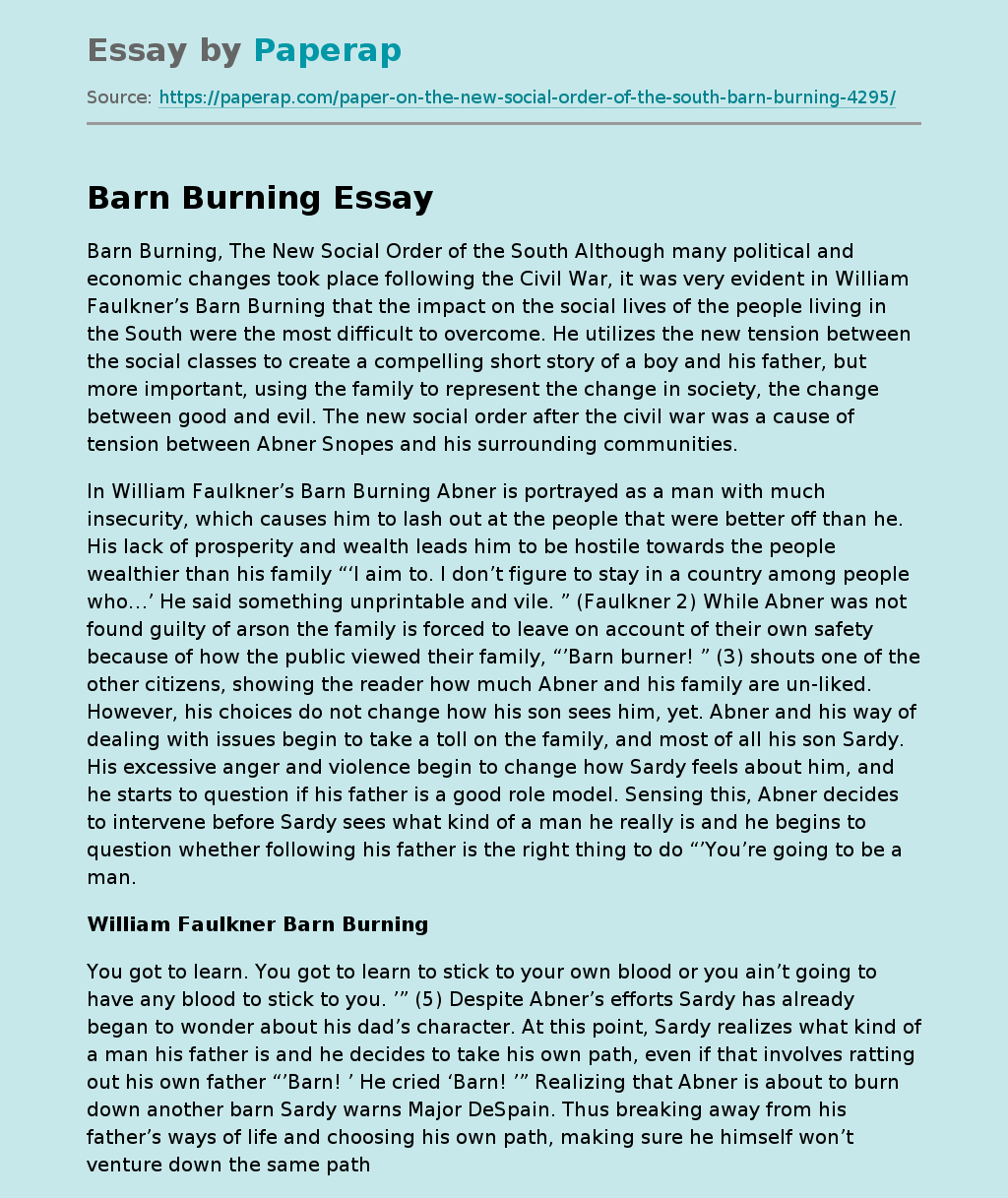Barn Burning and the New South's Social Order
Barn Burning, The New Social Order of the South Although many political and economic changes took place following the Civil War, it was very evident in William Faulkner’s Barn Burning that the impact on the social lives of the people living in the South were the most difficult to overcome. He utilizes the new tension between the social classes to create a compelling short story of a boy and his father, but more important, using the family to represent the change in society, the change between good and evil.
The new social order after the civil war was a cause of tension between Abner Snopes and his surrounding communities.
In William Faulkner’s Barn Burning Abner is portrayed as a man with much insecurity, which causes him to lash out at the people that were better off than he. His lack of prosperity and wealth leads him to be hostile towards the people wealthier than his family “‘I aim to.
I don’t figure to stay in a country among people who…’ He said something unprintable and vile. ” (Faulkner 2) While Abner was not found guilty of arson the family is forced to leave on account of their own safety because of how the public viewed their family, “’Barn burner! ” (3) shouts one of the other citizens, showing the reader how much Abner and his family are un-liked. However, his choices do not change how his son sees him, yet. Abner and his way of dealing with issues begin to take a toll on the family, and most of all his son Sardy.
His excessive anger and violence begin to change how Sardy feels about him, and he starts to question if his father is a good role model. Sensing this, Abner decides to intervene before Sardy sees what kind of a man he really is and he begins to question whether following his father is the right thing to do “’You’re going to be a man.
William Faulkner Barn Burning
You got to learn. You got to learn to stick to your own blood or you ain’t going to have any blood to stick to you. ’” (5) Despite Abner’s efforts Sardy has already began to wonder about his dad’s character. At this point, Sardy realizes what kind of a man his father is and he decides to take his own path, even if that involves ratting out his own father “’Barn! ’ He cried ‘Barn! ’” Realizing that Abner is about to burn down another barn Sardy warns Major DeSpain. Thus breaking away from his father’s ways of life and choosing his own path, making sure he himself won’t venture down the same path Abner did.
And hopefully be able to stay in one area for a prolonged period of time, making it possible for Sardy to better provide for his family. Abner is easily frustrated at the fact that his family must live in worse living conditions because he cannot provide for his family. He believes in the old ways of slavery, but now that he is beneath an African American in the DeSpain household he despises Major DeSpain and how he treats him and his family as if they are slaves.
Abner feels as if he is beneath the African American population after the war, referring to his own family as slaves “’That’s sweat. Nigger sweat… Maybe he wants to mix some white sweat with it’” (8). The Snopes’ quality of life is far worse than that of the African American butler in the DeSpain’s home. Because of Abners up-bringing in a racist time-period the thought of being below an African American angers him, especially when he is supposed to listen to what a black man tells him to do, “’Get out of the way, nigger. (7) Despite the new laws regarding slavery the overall attitude of Abner Snopes did not change towards blacks. It certainly did not help that the aristocracy found new ways to get their work done by victimizing poor families, and treating them almost as if they were slaves. Mr. Snopes despised Major DeSpain for treating him and his family un fairly, causing him to once again, attempt to burn down a barn to get revenge for DeSpains wrongdoings to his family.
Abner Snopes is contemptuous of the new ways of this country, refusing to accept the new order of doing things he decides to express his hatred through destroying of other people’s property. In William Faulkner’s Barn Burning he tells the reader of the devastating effects of the new social order of the South. Although many political and economic problems arouse resulting from the civil war the social effects on those living in the southern United States were the most evident in Faulkner’s short story Barn Burning.
Barn Burning and the New South's Social Order. (2019, Dec 05). Retrieved from https://paperap.com/paper-on-the-new-social-order-of-the-south-barn-burning-4295/

